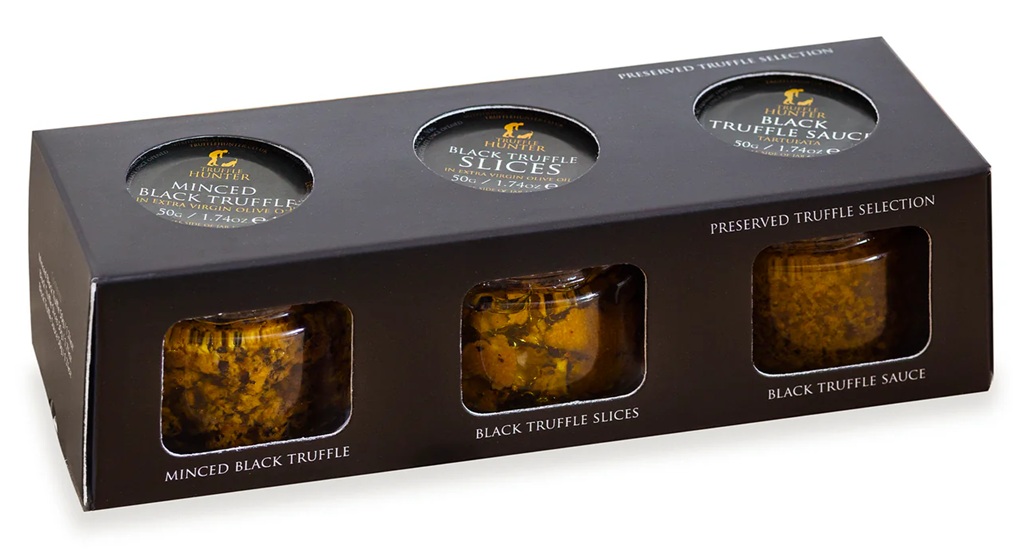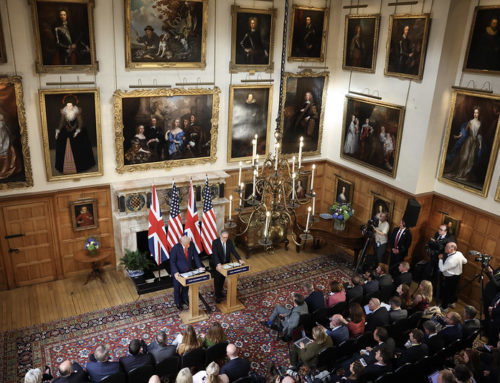1. Cotwald’s TruffleHunter goes global with UKEF
Nestled in the heart of the Cotswolds, TruffleHunter, a gourmet food producer based in South Cerney, has turned its passion for truffles into a global success story—thanks to support from UK Export Finance.
The company, known for its premium truffle-based products, recently broke into Southeast Asian markets including Malaysia and the Philippines, securing contracts worth £22,500. This expansion was made possible through UKEF’s Small Export Builder, a facility designed to help smaller UK businesses access international markets where traditional commercial insurance may fall short.
A Game-Changer for Small Exporters
The SEB offers an initial credit limit of £25,000, which can grow incrementally to £100,000 as businesses build a positive trading history. For TruffleHunter, this flexible approach was key to unlocking new opportunities in regions where smaller-value exports are often deemed too risky by commercial insurers.
“The SEB has been a game-changer for our business,” said Nigel Whitehouse, CEO of TruffleHunter. “The inability to secure commercial insurance for smaller value orders was a real barrier to accessing new markets like Malaysia and the Philippines. UKEF’s support gave us the confidence to diversify our export base and build relationships with buyers we simply couldn’t have worked with before.”
Building Confidence, One Contract at a Time
TruffleHunter’s initial success includes £7,500 in exports to Malaysia and £15,000 to the Philippines, with further orders secured in Thailand, Ecuador, and Mexico. The company’s achievements underscore the SEB’s mission: to empower small businesses to grow internationally, even in markets considered high-risk.
“TruffleHunter’s success demonstrates exactly why we launched the Small Export Builder,” said Hugh Francis, UKEF’s Export Finance Manager for Gloucestershire. “It grows with the business, allowing them to build confidence and trading relationships incrementally.”
A Broader Strategy for UK Growth
The SEB is part of the UK government’s broader Trade Strategy, aimed at making export protection more accessible to SMEs. In the 2024/25 financial year, UKEF provided a record £14.5 billion in new financing, supporting over 667 UK companies and up to 70,000 jobs.
TruffleHunter’s journey from local delicacy producer to international exporter is a testament to how targeted financial support can unlock global potential for small businesses. With truffles now gracing tables across Southeast Asia and beyond, the Cotswold firm is proving that even niche products can thrive on the world stage—with the right backing.
2. POSCO opens Poland EV motor core plant
POSCO International has officially inaugurated its state-of-the-art electric vehicle (EV) drive motor core plant in Brzeg, Opole Province, Poland, marking a strategic milestone in its global expansion and commitment to the European EV market.
The new facility, built with an investment of ₩94.1 billion (approx. €65 million) on a 100,000 m² site, boasts an annual production capacity of 1.2 million units. Trial production begins this October, with full-scale mass production scheduled for December. This plant is a cornerstone of POSCO’s “Local to Local” strategy—producing components near customer sites to enhance responsiveness and supply chain resilience.
A Strategic European Hub
The completion of the Poland plant finalises POSCO International’s three-continent production belt, joining facilities in South Korea (2.5 million units), Mexico (3.5 million units), and India (300,000 units). By 2030, the company aims to produce 7.5 million drive motor cores annually, targeting a 10% share of the global market.
This expansion aligns with the EU’s 2035 zero-emission vehicle mandate, which is accelerating demand for EV components. According to the International Energy Agency, EV sales in Europe are projected to reach 4 million units by 2025 and exceed 55% of new vehicle sales by 2030.
Advanced Technology and Sustainability
POSCO’s drive motor cores integrate Hyper NO non-oriented electrical steel sheets and its proprietary EMFree lamination technology, which enhances energy efficiency and reduces noise and vibration—key factors in improving EV range and cabin comfort.
The plant will initially supply 1.68 million units for Hyundai-Kia’s European EV production, with plans to expand to other automakers including Volkswagen. POSCO has already secured orders for 35 million units through 2033, underscoring its growing influence in the EV supply chain.
Leadership and Vision
At the opening ceremony on October 1, POSCO International CEO Lee Kye-In emphasised the strategic importance of the plant:
“The Poland drive motor core plant is a key hub for preemptively securing the European EV market. POSCO Group will lead the future mobility market with its integrated capabilities in EV steel, battery materials, and components.”
The facility is also seamlessly integrated with POSCO’s existing steel processing center in Poland, enabling efficient supply of high-performance materials to European automakers.
3. UK trade envoy visits Dhaka to boost economic ties
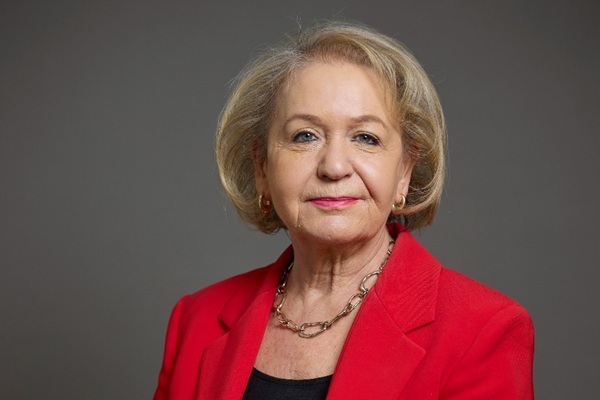
Rt Hon. Baroness Rosie Winterton of Doncaster DBE
The United Kingdom’s Trade Envoy to Bangladesh, The Rt Hon. Baroness Rosie Winterton of Doncaster DBE, has arrived in Dhaka for a five-day official visit aimed at deepening the longstanding economic and trade partnership between the UK and Bangladesh.
This marks Baroness Winterton’s second visit to Bangladesh since her appointment in January 2025, underscoring the UK’s commitment to supporting Bangladesh’s economic reform agenda and fostering mutual prosperity through enhanced trade and investment ties.
During her visit, Baroness Winterton is scheduled to meet with senior members of Bangladesh’s interim government, including Chief Adviser Professor Muhammad Yunus, Commerce Adviser Sheikh Bashir Uddin, Education Adviser Professor Chowdhury Rafiqul Abrar, and Special Envoy for International Affairs Lutfey Siddiqi. Discussions will focus on economic reforms, trade facilitation, and investment opportunities.
The envoy will also engage with leaders of major political parties such as the Bangladesh Nationalist Party, Bangladesh Jamaat-e-Islami, and the National Citizen Party, reaffirming the UK’s role as a long-term development partner.
A key highlight of the visit is the emphasis on the UK’s Developing Countries Trading Scheme, which grants Bangladeshi exports full duty-free access to the UK market until 2029. This initiative is designed to support Bangladesh’s export competitiveness as it transitions from Least Developed Country status in November 2026.
Baroness Winterton will also travel to Chattogram to observe UK-linked investments in action. These projects span sectors such as aviation, higher education, renewable energy, and defence, and are contributing to job creation, supply chain development, and sustainable growth in both countries.
In addition, the envoy will meet with representatives from British International Investment (BII) and local partners to explore opportunities in green finance and sustainable infrastructure, further aligning with the UK’s global climate and development goals.
Speaking on the visit, Baroness Winterton said:
“The UK and Bangladesh share a dynamic and growing economic partnership. I am here to reaffirm our commitment to supporting Bangladesh’s remarkable development journey and to explore new opportunities for trade and investment that benefit both our nations.”
British High Commissioner to Bangladesh, Sarah Cooke, added:
“The UK-Bangladesh trade partnership is going from strength to strength. This visit is a testament to our shared ambition for long-term economic growth and collaboration.”
As Bangladesh prepares for its national elections in February 2026 and its graduation from LDC status later that year, the UK’s engagement signals a strategic alignment to support the country’s transition into a middle-income economy.
4. UK and Greenland Resume Trade Negotiations
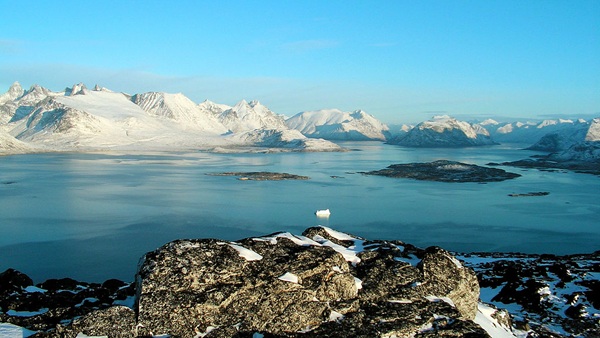
Jensbn Greenland scenery Wikimedia
The United Kingdom has officially resumed trade negotiations with Greenland, aiming to forge a modernised agreement that could significantly reduce tariffs on seafood imports and deepen cooperation on critical minerals. The talks mark a strategic pivot in Britain’s post-Brexit trade policy, with implications for both consumer prices and national security.
Seafood Tariffs Slated for Reduction
At the heart of the renewed discussions is the UK’s ambition to eliminate tariffs on over £70 million worth of seafood imports from Greenland, including prawns, shrimp, and cod. These products have faced tariffs of up to 20% since the UK’s departure from the European Union, driving up costs for British consumers and businesses.
Trade Secretary Peter Kyle stated that the deal could “bring down prices on supermarket shelves whilst supporting thousands of jobs in our fish-packing industry,” referencing key players such as Grimsby Fish Market and Royal Greenland UK.
Andrew Wrigley, Country Director at Royal Greenland UK, welcomed the move, saying it would “strengthen our long-standing commercial ties and ensure continued access to high-quality, sustainably sourced seafood for our British consumers.”
Strategic Minerals Partnership
Beyond seafood, the UK is also pursuing a critical minerals partnership with Greenland, which holds vast reserves of rare earth elements and other strategic resources. British firms already hold a third of Greenland’s mining licences, and the government sees this as an opportunity to secure supply chains for essential materials like copper, nickel, and graphite.
The deal is expected to support the UK’s broader “Plan for Change,” aimed at boosting economic resilience and reducing dependence on volatile global markets. Prime Minister Keir Starmer’s recent attendance at the European Political Community summit in Copenhagen, alongside Greenland’s Prime Minister Jens-Frederik Nielsen and Denmark’s Prime Minister Mette Frederiksen, underscored the geopolitical importance of the Arctic and North Atlantic regions.
Economic and Geopolitical Implications
The resumed negotiations reflect a growing recognition of Greenland’s strategic value—not only as a source of seafood and minerals but also as a key partner in Arctic security. The UK’s outreach aligns with NATO interests and mirrors similar moves by the EU, which signed a sustainable raw materials partnership with Greenland in 2023.
However, experts caution that while Greenland’s resources are abundant, the financial and environmental costs of extraction remain high. “Greenland makes a lot of sense as a diversification play,” said Sam Lowe of Flint Global, “but in practice, the cost associated with extracting these remains prohibitively high in most instances.”
Looking Ahead
As negotiations progress, stakeholders across the UK’s seafood and mining sectors are watching closely. A successful agreement could not only lower prices and boost jobs but also reinforce Britain’s role in shaping the future of Arctic trade and security.
5. Dubai Chambers Trade Mission to Ireland
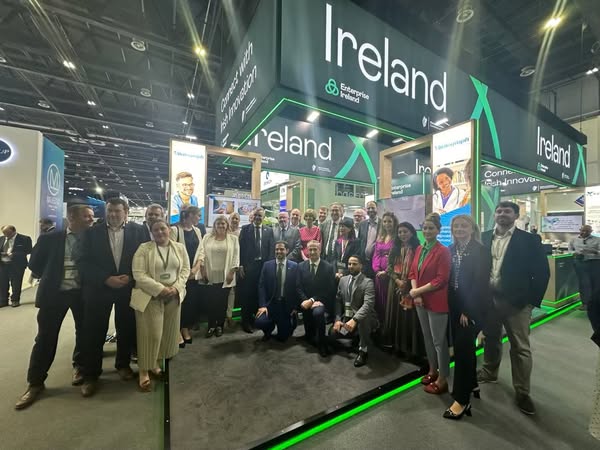
Dubai Chambers has successfully concluded a high-level trade mission to Ireland aimed at strengthening trade and investment cooperation between the two dynamic economies. Led by H.E. Eng. Sultan bin Saeed Al Mansoori, Chairman of Dubai Chambers, and accompanied by H.E. Mohammad Ali Rashed Lootah, President and CEO, the delegation engaged with key Irish stakeholders across public and private sectors to explore new avenues for economic collaboration.
The visit was part of Dubai Chambers’ “Growth Corridors” initiative, which seeks to deepen strategic partnerships with high-potential global markets. Ireland was selected for its thriving innovation ecosystem and growing trade ties with Dubai, with non-oil trade between the two reaching AED 4.1 billion in 2024—a 20% year-on-year increase.
During the mission, the delegation held meetings with Enterprise Ireland, the Dublin Chamber of Commerce, the Irish Strategic Investment Fund (ISIF), and the Ireland Foreign Direct Investment Agency. These discussions focused on enhancing cooperation in sectors such as financial services, transport and logistics, venture capital, and digital innovation.
The delegation also visited leading Irish innovation hubs including Dogpatch Labs, the Guinness Enterprise Center, and NovaUCD. These visits provided valuable insights into Ireland’s startup and tech landscape, fostering synergies with Dubai’s rapidly expanding digital economy.
H.E. Al Mansoori emphasised Dubai’s commitment to positioning itself as a global business hub:
“Dubai is continuing to consolidate its position by building strategic partnerships with major international markets such as Ireland. We remain committed to opening new pathways for trade and investment that support sustainable growth and generate promising opportunities for both business communities.”
Dubai Chambers highlighted its comprehensive support for Irish companies seeking to establish a presence in Dubai, offering access to regional markets and facilitating connections with potential partners. As of mid-2025, 460 Irish companies are active members of the Dubai Chamber of Commerce, with 62 new registrations in the first half of the year alone.
The trade mission marks a significant step in fostering bilateral relations and reflects Dubai’s agile response to global economic shifts. It also underscores the emirate’s ambition to be a gateway for Irish businesses expanding into the Middle East and beyond.

